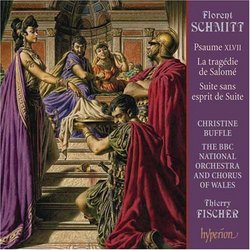2 for 3
Classic Music Lover | Maryland, USA | 07/13/2007
(4 out of 5 stars)
"Let's begin with the slightest number on this CD, the "Suite sans esprit de suite" (roughly translated: "Suite that is not in the spirit of a suite.") Later-career Schmitt, this work from the 1930s is interesting in places and, as is customary for this composer, features top-drawer orchestration. To my knowledge, there's only one other recording of this piece -- Leif Segerstam and the Rhenish Philharmonic on Cybelia, long out of print -- so this one rises to the top pretty easily.
Turning to the Psaume XLVII, much as I would love to report that we have a great new recording of this choral masterpiece, I have to say that Maestro Fischer hasn't quite pulled it off. I guess I've never heard an "English" performance of this music before this one. And even though we know the English can sing magnificently in celebratory works like Vaughan-Williams' "Sea Symphony," Walton's "Belshazzar's Feast" and Finzi's "For Saint Cecilia," they do tend to sound "tidy" in the process. Despite all the fanfares and percussion the Psaume delivers, that's the kind of feeling one gets here.
Also, the choice of Christine Buffle as the soprano soloist wasn't a good one. Her performance, while bright of voice, sounds tentative and oddly disengaged. (I wonder if she truly thought about the words she's singing: reflections on the Song of Solomon!) Both Andrea Guiot on EMI and Sharon Sweet on Erato/Apex, who give us renditions that are vastly different from one another, are much more effective.
The Wales Chorus is highly proficient technically and the orchestra sounds in fine form, too. But the conductor seems to want to turn parts of the Psaume into a "profound statement," which hinders the forward propulsion of the score and makes things sound episodic. In the final "meme mouvement" section in particular, his desire to build a great climax is laudable; it's just that in the process, the whole thing sounds so sluggish the listener's interest can't help but lag. The overall timing of this performance of the Psaume (over 30 minutes) is a full four minutes longer than the Janowski performance on Apex -- and it's almost entirely due to this one section of the work. Fortunately, Maestro Fischer snaps out of his torpor to bring things to a rousing conclusion, but it's a shame that he managed to get himself distracted along the way! Another quibble I have was his decision to excise the organ part from sections of the work. It's true that in those places, the organ doubles other instruments or the chorus, but it wasn't intended by the composer to be an either/or proposition (at least those instructions are nowhere to be found in my conductor's score).
It's difficult to recommend this recording over the Janowski/ONF recording on Apex, because both have their flaws. The best commercially made recording of Psaume XLVII, waxed in 1973 by Jean Martinon and the ORTF Orchestra and Chorus on EMI, is sadly not available today. It's been released twice on CD, but EMI keeps taking it out of print quickly (like they do so many of their other classical CD re-releases). For those who are particularly industrious, the CD featuring Jean Fournet and the Tokyo Metropolitan Symphony & Chorus on a Japanese label (Fontec FOCD 9249) is well-worth tracking down. Recorded in concert in 1992 in Maestro Fournet's 79th year, it's the best all-around reading IMHO. The Japanese soprano soloist is great (Shinobu Sato, but who's counting?), the orchestra is clearly excited about what they're doing, and the only sour notes come from the organist who seems to be following a completely different conductor at times. (This disk is occasionally listed on eBay, but I can't find it on Amazon's Japanese site.)
Finally, to the Tragedie de Salome. Here we definitely have a winning performance. It seems as though Fischer has "lived" with this music longer than the other two pieces. The opening prelude is drenched with atmosphere. The "Danse des Perles" is excitingly played, if not quite as dancelike as in Paul Paray's reading with the Detroit Symphony on Mercury. Things get even more intense in the second part, culminating in a truly shattering "Dance of Lightning" and the final cataclysmic "Dance of Fright." The BBC NOW orchestra rises to the occasion with some truly exemplary playing. This performance is better than the Janowski on Apex on the basis of the interpretation ... and better than the Paray on the basis of the fullness of the recording and the inclusion of the soprano obbligato instead of an English horn in one small but important section of the score. I think the Hyperion recording is also better, on balance, than the recordings by Martinon, Almeida and Dervaux that are no longer in print. I remember hearing a very good radio broadcast with Charles Dutoit and the Montreal Symphony from the 1980s, and Fischer's performance seems to come closest to that one interpretively.
In sum, a great Salome ... an opportunity to hear a Schmitt rarity from a later period ... and a flawed interpretation of the Psaume XLVII that nevertheless is still worth getting to know. Hats off to Hyperion for continuing to stretch its repertoire to include some of the lesser-known byways of the classical repertoire!"


 Track Listings (15) - Disc #1
Track Listings (15) - Disc #1